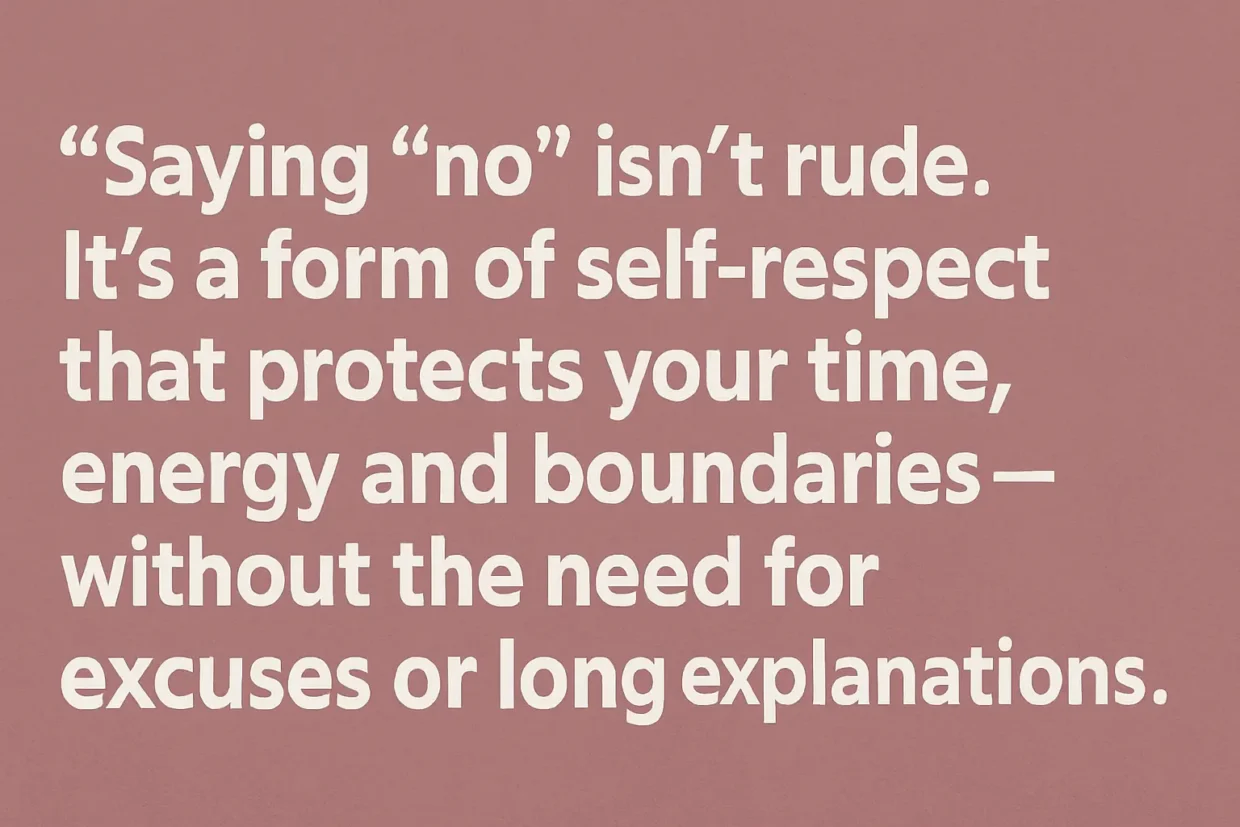For most of my life, I thought I needed a good excuse to say no. Declining an invitation felt like a crime, and I’d twist myself into knots coming up with some elaborate reason to make it seem valid.
Sorry, I can’t come to the dinner—I have a family thing that’s been planned for ages, and I might be coming down with something, and also the dog…
It was exhausting. Not just the excuses, but the emotional labor of managing how other people felt about my decisions.
Then something shifted. I realized I didn’t need to justify my choices to everyone. And that simple realization changed everything.
The Power of a Polite but Firm “No”
When you add a reason to your “no“, you’re not just explaining yourself—you’re giving someone a thread to pull on.
Say: “I can’t help you move this weekend, I’ve got to catch up on work.”
They reply: “Just take a break from work!”
Say: “I can’t make it to the party, I’m not feeling well.”
They say: “Come for an hour, it’ll cheer you up!”
Suddenly, it’s not a no anymore—it’s a debate. And honestly? I don’t have time or energy for that.
Now I simply say: 👉
Thanks for the invite, but I won’t be able to make it.
Kind, clear, and done.
You Don’t Owe Anyone Your Schedule
Let’s be real: not everyone deserves to know what you’re doing instead.
Sometimes, what I’m doing is absolutely nothing.
Sometimes I just want to lie on the couch, binge something ridiculous, order noodles, and wear a clay face mask while scrolling memes.
And I don’t need to justify that to anyone.
Just like I wouldn’t expect a friend to explain their “no” to me.
(“Oh, you’re not free tonight? Cool, let’s catch up another time.”)
That’s respect. That’s adult friendship.
The people who respect your time won’t demand explanations. The ones who do? They’re probably the ones who have been pushing your boundaries for way too long.
“No” Can Sound Kind, Too
There’s this fear—especially for women—that saying no will make us seem cold or selfish. I used to worry that I’d come off rude, especially when turning down social stuff.
But here’s the thing: it’s all about tone.
Saying:
“Thanks for thinking of me, but I’m going to pass this time.”
or
“That sounds lovely, but I can’t make it – hope it’s amazing!”
…sounds nothing like a cold rejection.
You don’t need to give people a 3-paragraph email about your schedule. A short, friendly message is enough.
When You Give Reasons, You Risk Negotiations
The minute you say: “I’d love to, but I have X…”
You open the door for: “Can’t you move X?” or “That’s okay, we’ll do Y instead!”
And suddenly, your “no” becomes something that needs defending.
It’s one of the reasons I started setting firmer boundaries in other parts of life, too – especially online. Like when I’m traveling and need a break from people pinging me 24/7 on WhatsApp or random work stuff.
These days, I just connect to a VPN (I personally use Surfshark when I’m on hotel Wi-Fi – t blocks trackers and hides my location), turn off notifications, and reclaim my quiet. No apologies. Just space.
You’re allowed to disconnect. You’re allowed to say no without turning it into a speech.
What If They Ask “Why Not?”
Oh, they will. Especially the persistent ones.
You don’t have to be rude – but you can be firm.
Try:
- “It just doesn’t work for me right now.”
- “I’ve got other priorities that day.”
- “I’m keeping my weekend clear, I need a break.”
- “I’d rather not go into it, but I appreciate the invite.”
Still too much? Just say:
👉 “I won’t be available, but thank you.”
And if they keep pushing? That’s not a reflection of your boundaries—it’s a reflection of theirs.
Saying No = Reclaiming Your Energy
Since I started practicing this, my mental energy has gone way up.
I don’t waste time crafting the perfect excuse.
I don’t get sucked into awkward negotiations.
I don’t overcommit and burn out.
It’s like finally installing an invisible firewall between myself and people’s expectations.
Funny enough, this mindset even made me rethink how I interact with technology. I used to be overly available—email, Slack, socials… you name it.
Now I use ExpressVPN not just to encrypt my internet connection when I’m on public networks, but to literally be less reachable. I log into accounts from different countries when I travel. I appear offline more. I feel more in control of what I say yes to and what I don’t.
TL;DR: You’re Not a Bad Person for Saying No
If you’ve ever felt guilty turning something down…
If you’ve said yes just to avoid explaining yourself…
If you’ve written a three-line text and backspaced it ten times…
This is your reminder:
No is a full sentence.
And it’s not mean. It’s honest. And it’s enough.
Need help setting boundaries online too? I’ve been using a few VPNs to create distance when needed (especially when working remotely, booking flights from different regions, or streaming while abroad). If you’re curious, here are the ones I trust:
| VPN | Why I Like It | Link |
|---|---|---|
| Surfshark | Easy to use, unlimited devices, great for switching off while traveling | Try Surfshark |
| ExpressVPN | Super fast, discreet, reliable in public Wi-Fi spots | Try ExpressVPN |
| NordVPN | Strongest privacy features, great for long-term digital detox | Try NordVPN |
Trust me – whether you’re learning to say no to people or to pop up ads and creepy trackers, a little privacy goes a long way.














